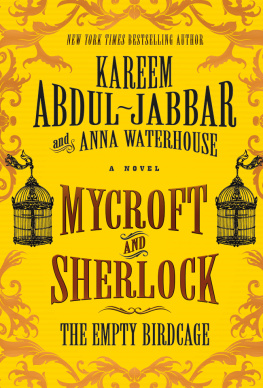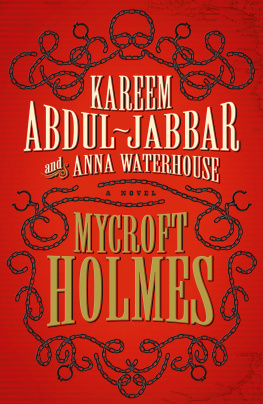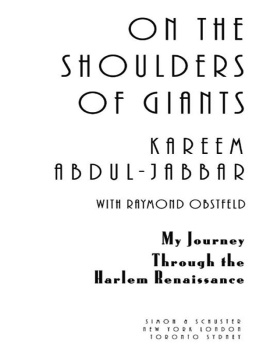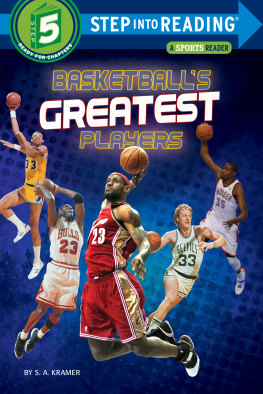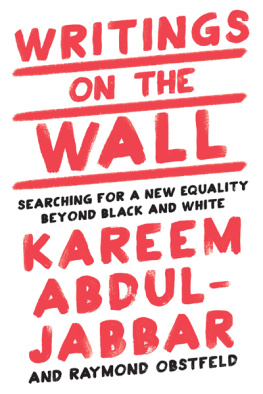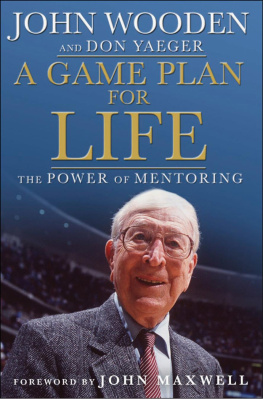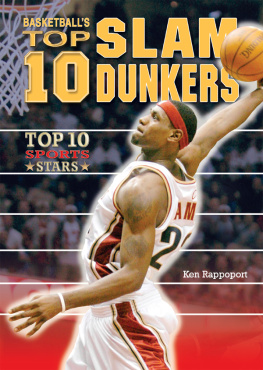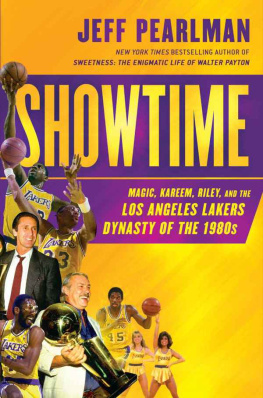Copyright 2017 by Kareem Abdul-Jabbar
Cover and title page photo copyright Norm Levin, Natural Portraits & Events
Cover design by Karina Granda
Cover copyright 2017 by Hachette Book Group, Inc.
All photographs courtesy of Kareem Abdul-Jabbar unless otherwise indicated.
Hachette Book Group supports the right to free expression and the value of copyright. The purpose of copyright is to encourage writers and artists to produce the creative works that enrich our culture.
The scanning, uploading, and distribution of this book without permission is a theft of the authors intellectual property. If you would like permission to use material from the book (other than for review purposes), please contact permissions@hbgusa.com. Thank you for your support of the authors rights.
Little, Brown and Company
Hachette Book Group
1290 Avenue of the Americas, New York, NY 10104
Visit us at LBYR.com
First Edition: November 2017
Little, Brown and Company is a division of Hachette Book Group, Inc. The Little, Brown name and logo are trademarks of Hachette Book Group, Inc.
The publisher is not responsible for websites (or their content) that are not owned by the publisher.
Library of Congress Cataloging-in-Publication Data
Names: Abdul-Jabbar, Kareem, 1947- author. | Obstfeld, Raymond, 1952 editor.
Title: Becoming Kareem : growing up on and off the court / Kareem Abdul-Jabbar, Raymond Obstfeld.
Description: New York : Little, Brown Books for Young Readers, 2017.
Identifiers: LCCN 2017036942| ISBN 9780316555388 (hardback) | ISBN 9780316555333 (ebook) | ISBN 9780316478137 (library edition ebook)
Subjects: LCSH: Abdul-Jabbar, Kareem, 1947 Juvenile literature. | Basketball playersUnited StatesBiographyJuvenile literature. | Social reformersUnited StatesBiographyJuvenile literature. | BISAC: JUVENILE NONFICTION / Biography & Autobiography / Sports & Recreation. | JUVENILE NONFICTION / Biography & Autobiography / Social Activists. | JUVENILE NONFICTION / Sports & Recreation / Basketball. | JUVENILE NONFICTION / Biography & Autobiography / Cultural Heritage. | JUVENILE NONFICTION / History / United States / 20th Century. | JUVENILE NONFICTION / Religion / Islam. | JUVENILE NONFICTION / Social Issues / Adolescence. | JUVENILE NONFICTION / Social Issues / Prejudice & Racism.
Classification: LCC GV884.A24 A3 2017 | DDC 796.323092 [B]dc23
LC record available at https://lccn.loc.gov/2017036942
ISBNs: 978-0-316-55538-8 (hardcover), 978-0-316-55533-3 (ebook)
E3-20171015-JV-PC
This is dedicated to all the young people who value
scholarship and the teachers and mentors who sacrifice for them.
I especially want to thank Dr. John Henrik Clarke
because the Harlem Youth Action Project, which he created,
was crucial to me in understanding my path.
KAJ
This book about the journey to becoming who you want
to be is dedicated to my children, Max and Harper,
whose own journey has been a constant source to me
of wonder, appreciation, and inspiration.
RO
T he world knows me as Kareem Abdul-Jabbar.
Im in the basketball record books under that name. I traveled the world as a US global cultural ambassador under that name. Google lists me about five hundred thousand times under that name. I was inducted into the Basketball Hall of Fame under that name. I received the Presidential Medal of Freedom from President Obama under that name. Part of that name has been passed on to my five children and to my grandchild.
But that wasnt the name I started life with, or grew up using. When I was a child, my friends and family knew me as Lewis Alcindor. Everyone called me Lew.
When I was twenty-four, I changed that. My team, the Milwaukee Bucks, had just won the National Basketball Association (NBA) championship, and I had been voted the Finals Most Valuable Player. Everything was going perfectly. The fans were cheering my name, Lew, and sports journalists were writing about how bright my future would be. I was at the height of the success I had worked so hard my whole life to achieve. Which is why it came as such a shock when the day after winning the national championship, I announced to the world that I was no longer Lew Alcindor, but Kareem Abdul-Jabbar, which means noble servant of God.
The world responded: Huh?
Three years earlier, while still a college student at the University of California, Los Angeles (UCLA), I had quietly converted to Islam, which I had been studying for several years. People thought it was just a phase I was going throughan impressionable college kid experimenting with alternative ideas and lifestyles, like becoming a vegan or getting an eyebrow piercing. They figured that as soon as I signed a contract for major money with a professional basketball team, I would revert to my familiar former self. But by changing my name in such a high-profile way, I was announcing on a much grander scale that I was no longer Catholic, but Muslim. No longer Lew, but Kareem.
And that I had no intention of going back.
Because of my fame as a professional basketball player, and because so few Americans knew anything about Islam back in the 1970s, there was a lot of angry backlash. People did not want me messing with their idea of who I was or what I represented to them. To many, by changing my religion and name, I was no longer the typical American kid playing a typical American sport embodying typical American values. I had become something foreign and exotic, like a newly discovered species of tree frog that just might be poisonous.
To me, by changing my religion and name, I was embracing the American ideal of freedom even more than when I was Lew Alcindor. I was becoming the person I chose to be rather than the person everyone was trying to convince me I should be. Lew Alcindor carried the name and religion of the white slaveholder who had exploited, humiliated, and abused my ancestors. How could I allow my successes to honor the name of such a villain? Instead, I decided to adopt the name and religion of many of the Africans who had been kidnapped and sold into slavery. Those were the people I should be honoring.
But many who learned of my decision were furious. Reporters wrote nasty things, fans wrote outraged letters, and some people even threatened to kill me. My parents were shocked and hurt by my rejection of their name. My teammates were confused; some felt personally betrayed. Despite all that, I knew I had made the right choice because I was, after all those years, finally who I wanted to be.
The long road to discovering who I wanted to be was not straight or easy. I made mistakesplenty of them. Fortunately, I didnt have to travel that road by myself. Sometimes it felt as if I were walking alone, carrying a heavy burden on my shoulders. But then Id look up and see someone there to help me carry that weight, or to shine a light on the path ahead so I knew where to go and what to avoid. I didnt always realize they were helping me at the time, nor did I always listen to them. At least the mistakes were mine and the successes were mine because the path was mine.
From grammar school through my twenty years as a professional basketball player, my team coaches have helped guide me. But I have also had other people who helped me along my path even though they werent part of any team. I think of them as life coaches. Some were teachers, like my martial arts teacher and an eventual international movie star, Bruce Lee. Some were friends, like the world champion boxer Muhammad Ali. Some were actual coaches, like my UCLA coach John Wooden, whose lessons on and off the court still deeply influence me today. Some were writers, singers, poets, athletes, or activists whom I never met, and who may have even lived hundreds of years ago, but whose lives and works inspired me to see the world differently and helped me see my place in it.


